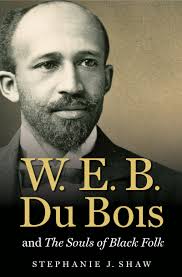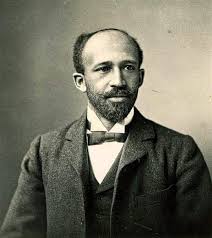The Souls of Black Folk Page #16
The Souls of Black Folk is a 1903 work of American literature by W. E. B. Du Bois. It is a seminal work in the history of sociology and a cornerstone of African-American literature. The book contains several essays on race, some of which the magazine Atlantic Monthly had previously published.
The ten years that follow youth, the years when first the realization comes that life is leading somewhere,—these were the years that passed after I left my little school. When they were past, I came by chance once more to the walls of Fisk University, to the halls of the chapel of melody. As I lingered there in the joy and pain of meeting old school-friends, there swept over me a sudden longing to pass again beyond the blue hill, and to see the homes and the school of other days, and to learn how life had gone with my school-children; and I went. Josie was dead, and the gray-haired mother said simply, “We’ve had a heap of trouble since you’ve been away.” I had feared for Jim. With a cultured parentage and a social caste to uphold him, he might have made a venturesome merchant or a West Point cadet. But here he was, angry with life and reckless; and when Fanner Durham charged him with stealing wheat, the old man had to ride fast to escape the stones which the furious fool hurled after him. They told Jim to run away; but he would not run, and the constable came that afternoon. It grieved Josie, and great awkward John walked nine miles every day to see his little brother through the bars of Lebanon jail. At last the two came back together in the dark night. The mother cooked supper, and Josie emptied her purse, and the boys stole away. Josie grew thin and silent, yet worked the more. The hill became steep for the quiet old father, and with the boys away there was little to do in the valley. Josie helped them to sell the old farm, and they moved nearer town. Brother Dennis, the carpenter, built a new house with six rooms; Josie toiled a year in Nashville, and brought back ninety dollars to furnish the house and change it to a home. When the spring came, and the birds twittered, and the stream ran proud and full, little sister Lizzie, bold and thoughtless, flushed with the passion of youth, bestowed herself on the tempter, and brought home a nameless child. Josie shivered and worked on, with the vision of schooldays all fled, with a face wan and tired,—worked until, on a summer’s day, some one married another; then Josie crept to her mother like a hurt child, and slept—and sleeps. I paused to scent the breeze as I entered the valley. The Lawrences have gone,—father and son forever,—and the other son lazily digs in the earth to live. A new young widow rents out their cabin to fat Reuben. Reuben is a Baptist preacher now, but I fear as lazy as ever, though his cabin has three rooms; and little Ella has grown into a bouncing woman, and is ploughing corn on the hot hillside. There are babies a-plenty, and one half-witted girl. Across the valley is a house I did not know before, and there I found, rocking one baby and expecting another, one of my schoolgirls, a daughter of Uncle Bird Dowell. She looked somewhat worried with her new duties, but soon bristled into pride over her neat cabin and the tale of her thrifty husband, and the horse and cow, and the farm they were planning to buy. My log schoolhouse was gone. In its place stood Progress; and Progress, I understand, is necessarily ugly. The crazy foundation stones still marked the former site of my poor little cabin, and not far away, on six weary boulders, perched a jaunty board house, perhaps twenty by thirty feet, with three windows and a door that locked. Some of the window-glass was broken, and part of an old iron stove lay mournfully under the house. I peeped through the window half reverently, and found things that were more familiar. The blackboard had grown by about two feet, and the seats were still without backs. The county owns the lot now, I hear, and every year there is a session of school. As I sat by the spring and looked on the Old and the New I felt glad, very glad, and yet— After two long drinks I started on. There was the great double log-house on the corner. I remembered the broken, blighted family that used to live there. The strong, hard face of the mother, with its wilderness of hair, rose before me. She had driven her husband away, and while I taught school a strange man lived there, big and jovial, and people talked. I felt sure that Ben and ’Tildy would come to naught from such a home. But this is an odd world; for Ben is a busy farmer in Smith County, “doing well, too,” they say, and he had cared for little ’Tildy until last spring, when a lover married her. A hard life the lad had led, toiling for meat, and laughed at because he was homely and crooked. There was Sam Carlon, an impudent old skinflint, who had definite notions about “niggers,” and hired Ben a summer and would not pay him. Then the hungry boy gathered his sacks together, and in broad daylight went into Carlon’s corn; and when the hard-fisted farmer set upon him, the angry boy flew at him like a beast. Doc Burke saved a murder and a lynching that day. The story reminded me again of the Burkes, and an impatience seized me to know who won in the battle, Doc or the seventy-five acres. For it is a hard thing to make a farm out of nothing, even in fifteen years. So I hurried on, thinking of the Burkes. They used to have a certain magnificent barbarism about them that I liked. They were never vulgar, never immoral, but rather rough and primitive, with an unconventionality that spent itself in loud guffaws, slaps on the back, and naps in the corner. I hurried by the cottage of the misborn Neill boys. It was empty, and they were grown into fat, lazy farm-hands. I saw the home of the Hickmans, but Albert, with his stooping shoulders, had passed from the world. Then I came to the Burkes’ gate and peered through; the enclosure looked rough and untrimmed, and yet there were the same fences around the old farm save to the left, where lay twenty-five other acres. And lo! the cabin in the hollow had climbed the hill and swollen to a half-finished six-room cottage. The Burkes held a hundred acres, but they were still in debt. Indeed, the gaunt father who toiled night and day would scarcely be happy out of debt, being so used to it. Some day he must stop, for his massive frame is showing decline. The mother wore shoes, but the lion-like physique of other days was broken. The children had grown up. Rob, the image of his father, was loud and rough with laughter. Birdie, my school baby of six, had grown to a picture of maiden beauty, tall and tawny. “Edgar is gone,” said the mother, with head half bowed,—‘gone to work in Nashville; he and his father couldn’t agree.” Little Doc, the boy born since the time of my school, took me horseback down the creek next morning toward Farmer Dowell’s. The road and the stream were battling for mastery, and the stream had the better of it. We splashed and waded, and the merry boy, perched behind me, chattered and laughed. He showed me where Simon Thompson had bought a bit of ground and a home; but his daughter Lana, a plump, brown, slow girl, was not there. She had married a man and a farm twenty miles away. We wound on down the stream till we came to a gate that I did not recognize, but the boy insisted that it was “Uncle Bird’s.” The farm was fat with the growing crop. In that little valley was a strange stillness as I rode up; for death and marriage had stolen youth and left age and childhood there. We sat and talked that night after the chores were done. Uncle Bird was grayer, and his eyes did not see so well, but he was still jovial. We talked of the acres bought,—one hundred and twenty-five,—of the new guest-chamber added, of Martha’s marrying. Then we talked of death: Fanny and Fred were gone; a shadow hung over the other daughter, and when it lifted she was to go to Nashville to school. At last we spoke of the neighbors, and as night fell, Uncle Bird told me how, on a night like that, ’Thenie came wandering back to her home over yonder, to escape the blows of her husband. And next morning she died in the home that her little bow-legged brother, working and saving, had bought for their widowed mother.
Translation
Translate and read this book in other languages:
Select another language:
- - Select -
- 简体中文 (Chinese - Simplified)
- 繁體中文 (Chinese - Traditional)
- Español (Spanish)
- Esperanto (Esperanto)
- 日本語 (Japanese)
- Português (Portuguese)
- Deutsch (German)
- العربية (Arabic)
- Français (French)
- Русский (Russian)
- ಕನ್ನಡ (Kannada)
- 한국어 (Korean)
- עברית (Hebrew)
- Gaeilge (Irish)
- Українська (Ukrainian)
- اردو (Urdu)
- Magyar (Hungarian)
- मानक हिन्दी (Hindi)
- Indonesia (Indonesian)
- Italiano (Italian)
- தமிழ் (Tamil)
- Türkçe (Turkish)
- తెలుగు (Telugu)
- ภาษาไทย (Thai)
- Tiếng Việt (Vietnamese)
- Čeština (Czech)
- Polski (Polish)
- Bahasa Indonesia (Indonesian)
- Românește (Romanian)
- Nederlands (Dutch)
- Ελληνικά (Greek)
- Latinum (Latin)
- Svenska (Swedish)
- Dansk (Danish)
- Suomi (Finnish)
- فارسی (Persian)
- ייִדיש (Yiddish)
- հայերեն (Armenian)
- Norsk (Norwegian)
- English (English)
Citation
Use the citation below to add this book to your bibliography:
Style:MLAChicagoAPA
"The Souls of Black Folk Books." Literature.com. STANDS4 LLC, 2025. Web. 24 Feb. 2025. <https://www.literature.com/book/the_souls_of_black_folk_310>.








Discuss this The Souls of Black Folk book with the community:
Report Comment
We're doing our best to make sure our content is useful, accurate and safe.
If by any chance you spot an inappropriate comment while navigating through our website please use this form to let us know, and we'll take care of it shortly.
Attachment
You need to be logged in to favorite.
Log In